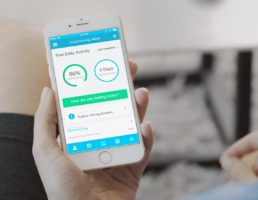It is estimated that 190 million Americans are affected by one or more chronic conditions,1 most of which can be managed via medication.2 But medicine only works when taken consistently, making medication adherence essential to achieving positive treatment outcomes. Non-adherence is a loss for everyone: for the patients who are unable to improve their health, for physicians who are unable to help those in their care live their best lives, and for pharmaceutical companies whose scientific breakthroughs stay on shelves.
How big of an issue is non-adherence? It is estimated that, on average, patients only take half of their prescribed doses, irrespective of whether it is for a life-threatening condition or just a simple infection.3 This problem of non-adherence is estimated to cost the U.S. healthcare system between $100 billion to $290 billion annually.3 Improving medication adherence is a goal that can be accomplished by first understanding the reasons for why individuals do not take their medications as prescribed.
In the May 22/29, 2013 Journal of the American Medical Association,4 Dr. Marcum and colleagues categorized the causes of nonadherence as:
1) not understanding the relevance of medication to one’s health and well-being
2) concluding that the costs of taking medication outweigh benefits
3) finding medication management too complex to handle
4) being insufficiently vigilant
5) holding inaccurate or conflicting normative beliefs about medications
6) not perceiving medication to have therapeutic efficacy
Similarly, a WHO study on chronic conditions showed that adherence rates are influenced by the structure of healthcare systems, the patient–provider relationship, disease characteristics, the recommended treatment, and socioeconomic factors.5
The good news is that technology and modern innovations can be leveraged to combat non-adherence. There are smart devices and intelligent tools that facilitate ease of use, enhance patient-physician communication, improve comfort, and make administration of medications more convenient. Some tech companies have even taken to developing interactive software products that can track dosage and employ gamification to incentivize adherence by rewarding patients who stay atop of their treatment plan.3
Portal Instruments’ needle-free injector, currently under development, is designed with the patient in mind to create a better patient experience without compromising the efficacy of the pharmaceutical product. As a connected device, this next generation needle-free injector can also log injections, send reminder notifications for the next dose, and eliminate the need for patients to keep manual records. Patients can use this information when having discussions with their healthcare provider. This supports the studies5 that show high quality communication between the physician and patient enhances treatment adherence.
Modern medicine can help people live healthier and more fulfilling lives. Cutting-edge technologies such as Portal’s needle-free injector have the potential to make treatments more comfortable and easier for the patient, with the goal to improve adherence and ultimately outcomes. Learn more about how Portal is different by clicking here.
1 Partnership to Fight Chronic Disease. 2015 Fact Sheet. Available at: https://www.fightchronicdisease.org/pfcd-in-the-states. Accessed Dec 1, 2017.
2 CVS Health. “Promoting Medication Adherence” Available at: https://cvshealth.com/thought-leadership/promoting-medication-adherence. Accessed Dec 1, 2017.
3 “Medication Adherence Tech: A dynamic and crowded market, but where are the winners in the space?” Available at: http://www.mobihealthnews.com/content/medication-adherence-tech-dynamic-and-crowded-market-where-are-winners-space-part-1-2. Accessed Dec 1, 2017.
4 Marcum Z et. al. “Medication Nonadherence: a Diagnosable and Treatable Medical Condition” JAMA 2013 May 22;309(20):2105-6
5 Marengo MF et. al. “Improving treatment adherence in patients with rheumatoid arthritis: what are the options?” Int J Clin Rheumtol. 2015 Oct 1;10(5):345-356
Pages of the Portal Instruments website may contain links to third party websites that are not under the control of Portal Instruments. Portal Instruments is not responsible for the content of any such site and the inclusion of these links does not imply the endorsement of the content of the linked site by Portal Instruments.
Portal’s platform is in development and not available for sale or use.


